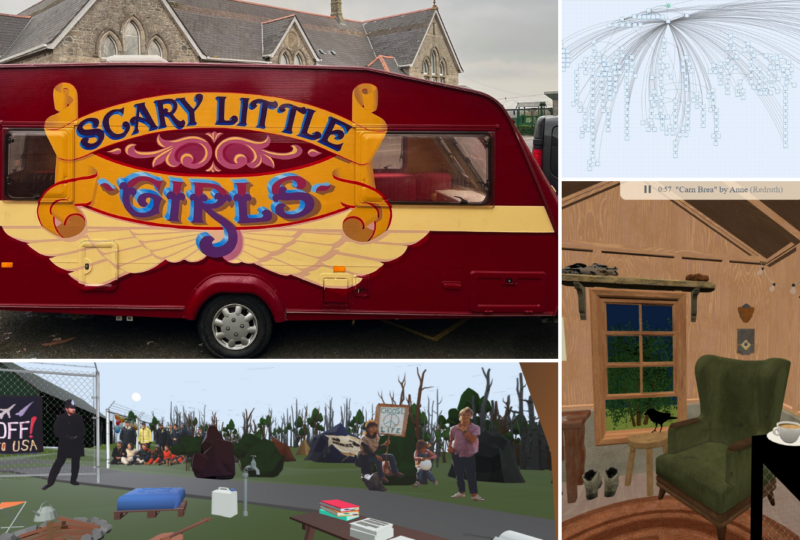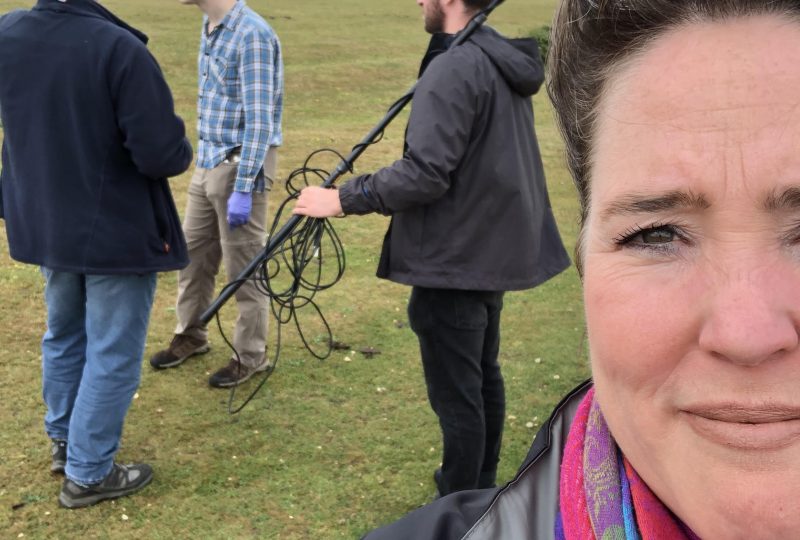***PRESS RELEASE***
Calling all Greenham Women…
Were you a Greenham woman? Do you have a story about the peace camp? Do you have friends or family who lived there or were visitors?
If so, the organisers of a major new project set up to interview and celebrate the Greenham Women would like to hear from you.
Scary Little Girls and The Heroine Collective have been awarded a grant by the Heritage Lottery to trace the lives and stories of the feminist peace campaigners who kept a camp at Greenham Common for 20 years. This will then be turned into a touring exhibition to tell the story of a unique campaign and a camp that radicalised a generation.
“Whether you were there for a day or the duration, if you have interesting memories, we need you to get in touch” explains Rebecca Mordan, artistic director of the award-winning south west theatre company Scary Little Girls. “There is a real urgency about this. One of the camp leaders died in 2016, and it became clear that there is a real danger that stories like hers – about this utterly unique period in modern history – will be lost forever. Our mission is to make sure no more stories are lost.
“Their lives must be properly documented and celebrated. Let’s not forget that they triumphed. The last missiles left the base for good in 1991!”
The story begins a decade earlier – in 1981 – when a group of women marched from Wales to Greenham Common to protest against the British government’s decision to allow American Cruise missiles to be sited there. When the military authorities refused to meet them, the women set up camp.
Greenham Common Peace Camp would go on to occupy space outside the air base until 2000, attracting women from all over the world and organising the largest women-only protests since the Suffragettes. The camp was a women-only space, meaning that the camps organising, protesting, socialising and democracy was run without men involved in any way.
“Women came from all parts of the UK and all backgrounds to stay at Greenham, some for a weekend and some for years,” says Kate Kerrow of The Heroine Collective. “In the days before the internet or mobile phones they were organising events like Embrace the Base which saw 70,000 protesters at the camp. These women inspired similar camps all over world. They resisted onslaughts from the police and the military and rose above being reviled by press like the Sun who hated and libelled them – all to show that another, more peaceful world was possible. What heroes!”
Between now and the end of 2019 The Living Legacy of the Greenham Women will interview and celebrate the Greenham Women, supported by partners Falmouth University, The University of West England, The Women’s Library, The Feminist Library, Goldsmiths University, The East End Women’s Library, Hypatia Trust, Dreadnought South West, Cornwall Library Services, Kresen Kernow and Parliament’s Vote 100 project.
You can get in touch via email – [email protected] and you can also join the conversation using the hashtag #HLFGreenham.
+ + + Ends + + +
A few things you might want to know about the Greenham Women:
– The Greenham Women’s tactics of Non Violent Direct Action were taken from luminaries like The Ladies Land League in Ireland, and Gandhi in India. The women developed them to such an extent that they were able to remain on a site people repeatedly tried to remove them from, eventually growing their presence to an unremovable camp of thousands. Despite repeated arrests, police and military harassment, and a lack of any facilities like toilets or electricity, the camp lasted from 1981 to 2000.
– Started by women from Wales, Greenham became a melting pot for women all over the UK to protest a common cause, with strong representation from women from the South West, Scotland and Ireland. This radicalised a generation across class and geography about women’s rights in a way hitherto unseen since the Suffrage Movement. Women also came from all over the world to support as word of the camp grew including Julie Christie, Yoko Ono, Holly Near and Fiona Bruce.
– The children of Greenham women today report their time at the camp and the effect it had on their politics and life choices. Many are leaders of the feminist movement today, continuing Greenham’s matrifocal legacy.
– The Greenham Women were thrust into the media. This meant that ordinary women suddenly found themselves the object of smear campaigns by the tabloids and were sought out for comment by broadsheets and television. The media obsession with Greenham was a huge part of pushing discussions around feminism into the mainstream – where it has remained ever since.
– “Embrace the Base” was the largest women’s demonstration in modern history. It, and the camp, inspired similar movements all around the world, including in the USA and Russia.
– Ultimately the peace camp triumphed. By 1989, the missiles were being removed from the base and by 1990, the US had declared it out of operation.
Press Enquiries
Cat Allen, JKC Marketing
[email protected] / 01326 312451
Join us on Facebook
https://www.facebook.com/ScaryLittleGirls/
Or Twitter
@ScaryLittleGs





